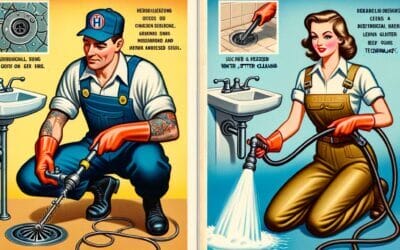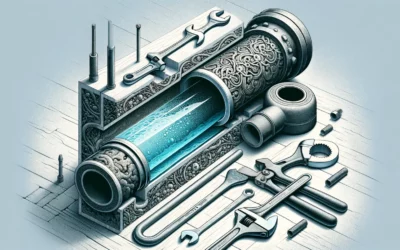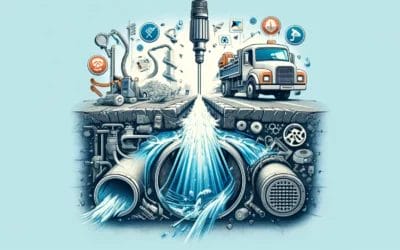Welcome to our latest post, “Expert Insights: Why Underground Water Pipes Corrode in Your Yard”. This informative piece is jam-packed with expert knowledge, providing insights into what causes underground water pipes to corrode in your garden. It is designed to educate you on the factors that influence corrosion, such as soil conditions or pipe material, while offering potential solutions to this common problem. By understanding why and how this happens, you’ll be better equipped to prevent corrosion, save potential repair costs, and enhance the longevity of your water supply system. So dive in and let’s arm you with the knowledge you need to safeguard your water pipes from unnecessary corrosion.
Understanding the Basics: What is Pipe Corrosion
<Pipe corrosion is a commonly occurring problem with underground water pipes, especially those concealed in the backyard. The phenomenon involves the gradual degradation of pipe materials by a natural chemical reaction that matriculates a destructive force on the water pipes. Particularly, metal pipes are susceptible to corrosion as they react with the soil and the water, and over time, this can lead to leaks or a complete failure of the system.
To curb such issues, it is essential to comprehend the factors that contribute to pipe corrosion. The most prevalent cause is the interaction between the pipes and the physical and chemical constituents found in soil and water. These interactions give rise to various types of corrosions, among which the most common are galvanic corrosion and electrolytic corrosion.
- Galvanic corrosion: This usually occurs when two diverse metals are in contact with one another, with water as a catalyst, which leads to one metal getting corroded. For instance, if copper and steel pipes are connected, the steel pipe will corrode faster as it acts as an anode to the copper pipe.
- Electrolytic corrosion: This takes place when an electric current travels via a metallic surface leading to corrosion, a phenomenon frequently observed near electrical grounding systems.
In addition to material interaction, the environmental conditions surrounding the pipes also play a significant role in pipe corrosion. Elevated levels of minerals, salts or impurities in the soil can accelerate corrosion by creating a highly conductive channel around the pipes. Other influential factors are soil moisture levels, temperature, soil resistivity and levels of microbial activity.
The table below summarises the key factors contributing to pipe corrosion along with their brief description:
| Contributing Factor | Description |
|---|---|
| Physical and chemical constituents | Includes the interaction of pipe materials with the chemicals and minerals in the soil and water. |
| Environmental conditions | Factors like soil moisture levels, temperature and resistivity, mineral, salt and impurity levels etc. |
| Material interaction | The interaction between two diverse metal pipes or metal pipes and an electrical current path. |
This understanding will help homeowners, engineers and contractors make informed decisions while installing or repairing water pipe systems, potentially averting expensive and inconvenient failures in the future.

Delving Deeper: The Role of Soil Composition in Pipe Corrosion
When it comes to underground pipe corrosion, there’s more than meets the eye. A key factor that often goes unnoticed is the composition of the soil itself. Believe it or not, certain soil properties can accelerate the process of pipe corrosion. For instance, soil with high moisture content, and those high in salts or acid are known to be corrosive to many types of metals. Furthermore, soil composition directly affects the microbial populations living within the soil, some of which can induce or intensify corrosion of underground water pipes.
The pH of the soil, a measure of its acidity or alkalinity, remarkably influences the rate of corrosion. For instance, soils with low pH (acidic soils) tend to speed up corrosion, whereas soils with high pH (alkaline soils) slow it down. Soil resistivity, another crucial factor, gauges the soil’s resistance to electric current. The higher the resistivity, the less corrosive the soil is, and vice versa. Wet, salty, or acidic soils have lower resistivities, which makes them more corrosive. Let’s delve deeper and put these variables into a comparison table:
| Property | High Corrosion Risk | Low Corrosion Risk |
|---|---|---|
| pH Level | Low (Acidic) | High (Alkaline) |
| Soil Resistivity | Low | High |
| Moisture Content | High | Low |
Understanding soil composition and its impact on pipe corrosion can help in making strategic decisions when it comes to pipe materials selection, use of protective coatings, and other corrosion prevention measures. It emphasizes the importance of soil testing before installing underground water pipes.
The Chemistry Underneath: Explaining How Underground Water Pipes Corrode
Water pipes installed underground in your yard are particularly susceptible to corrosion, a process that gradually deteriorates the pipes over time. This corrosion typically results from a chemical reaction between the pipe material and the surrounding soil and water. Understanding the chemistry behind this process can serve as an invaluable tool in preventing or mitigating damage to your pipes.
Three main factors contribute to the chemical reaction causing pipe corrosion:
- Oxidation: This reaction occurs when the pipe’s metal atoms interact with oxygen, creating what we commonly refer to as rust. Compounds such as iron oxide form, which can eat away at pipes over time.
- pH levels: The pH level of the soil in which the pipe is buried can significantly affect corrosion. Highly acidic or alkaline soils accelerate the corrosion process, as they facilitate the migration of metallic ions from the pipe into the soil.
- Electrolytes: Soils high in salts and other dissolvable minerals increase their conductivity, promoting electrical currents that speed up the corrosion process.
Each of these factors contributes to the overall process of pipe corrosion in different degrees based on specific environmental conditions. Therefore, it is crucial to regularly assess these elements to develop an effective pipe maintenance and replacement strategy.
| Metal | Corrosion Potential | Commonly Found In |
|---|---|---|
| Iron | High | Older and traditional underground water pipes |
| Copper | Medium | Drinking water installations |
| Aluminum | Low | Rarely used in personal residential structures |
Understanding the metals used in your pipe systems can also give you insights into predicting potential corrosion damage. Refer to the table to understand the corrosion potential of common metals used in water pipe construction.

Accurate Diagnosis: Identifying the Signs of Pipe Corrosion in Your Yard
To efficiently tackle pipe corrosion in your yard, it’s essential to identify the early warning signs to address the issue promptly. One of the most indicative signs is discolored water. This often suggests that your pipes are rusting. Another clear sign is low water pressure. Corrosion can cause blockages in the pipes, preventing water from flowing freely. Additionally, if you start noticing an unpleasant or unusual odor in your water, this may also hint at a corrosion problem.
| Early Warning Signs of Pipe Corrosion |
|---|
| Discolored Water |
| Low Water Pressure |
| Unpleasant Odor |
It’s worth noting that pipe corrosion doesn’t just occur randomly – several factors can increase the risk. Old pipes made of iron are one of the most common culprits, as iron can easily rust when in contact with water. Moreover, the soil composition in your yard can also significantly impact the corrosion rates; certain components in the soil can speed up the process. Lastly, the pH of your water can also play a crucial role – if it is too acidic, it can rapidly corrode the pipes.
- Old Iron Pipes: Significant factors in pipe corrosion.
- Soil Composition: Certain components can speed up the process.
- pH Levels: Highly acidic water can lead to rapid corrosion.
It’s essential to keep an eye out for these factors to prevent pipe corrosion or manage the situation before it escalates into a more problematic and costly situation.

Taking Action: Pragmatic Measures to Prevent Underground Pipe Corrosion
Understanding the cause of pipe corrosion is paramount to identifying pragmatic measures for prevention. The predominant factor resulting in underground water pipe erosion is the corrosive nature of the soil surrounding the pipes, coupled with the pipe’s material. Soil acidity, oxygen level, temperature, moisture, and minerals all significantly contribute to the pace at which pipes corrode. Conversely, pipes made from materials like iron and steel are more vulnerable to rust, thus hastening deterioration.
Synchronizing your knowledge on these key causes with preventive measures can help in reducing pipe corrosion to a noteworthy extent. Here are a few recommendations:
- Use a Corrosion Inhibitor: The addition of a corrosion inhibitor to the water can form a protective layer on the pipe, thus preventing corrosion.
- Regular Professional Check-ups: Periodic professional inspections can help detect and rectify corrosion at an early stage.
- Replace Old Pipes: Consider replacing old, corroded pipes with those made from corrosion-resistant materials like plastic or copper.
- Control Soil Conditions: Adjusting the soil parameters around the pipe, such as its moisture and pH levels, can decrease the rate of corrosion.
| Type of Pipe | Corrosion Rate |
|---|---|
| Iron | High |
| Steel | Medium |
| Plastic | Low |
| Copper | Low |
When it comes to safeguarding underground water pipes from corrosion, taking immediate and efficient action is crucial. The blend of understanding the causes, regular maintenance, and prudent pipe material choice can substantially extend the lifespan of your underground water pipes.
Expert Recommendations: Choosing the Right Material for Underground Water Pipes
Material Selection: The Critical Factor
Understanding the reasons why underground water pipes corrode enables homeowners to make informed decisions about the materials to use when installing or replacing pipes. Among the most preferred materials for underground pipe installations include cast iron, copper, plastic and galvanized steel.
- Cast Iron: Despite being heavy and labor-intensive to install, cast iron pipes are known for their durability. They can resist most forms of corrosion, making them ideal for high-trafficked areas.
- Copper: The preferred choice for many plumbers due to its lightness, flexibility, and resistance to both heat and corrosion.
- Plastic PVC: Lightweight and resistant to chemical corrosion. While primarily used in carrying wastewater and drainage, modern PVC pipes can also be used for potable water.
- Galvanized Steel: Known for their strength, galvanized steel pipes are coated to protect against corrosion but may still rust over time.
Tailoring to Local Conditions
Whereas the above materials possess their unique strengths, their effectiveness could greatly vary by local conditions. The presence of certain minerals, soil composition, proximity to electrical currents, and water quality all affect pipe durability. For instance, in areas with high soil acidity, plastic pipes may outlast metal pipes. Conversely, in regions with alkaline soils, the corrosive impacts may be reduced and copper or iron pipes will perform magnificently. A brief overview of how materials fare in various conditions is summarized in the following table.
| Material | Soil Condition | Expected Durability |
|---|---|---|
| Cast Iron | Neutral-Alkaline Soil | High |
| Copper | Neutral-Alkaline Soil | High |
| Plastic | Acidic Soil | High |
| Galvanized Steel | Neutral Soil | Moderate |
To choose the right material for your underground water pipes, consider consulting with a local expert who understands these factors and can provide the best advice tailored to your specific property needs.
To Conclude
In conclusion, understanding why underground water pipes corrode in your yard is essential in ensuring the longevity of your plumbing system, ultimately saving you from costly repairs and untold frustrations. Expert insights shed light on various external factors like soil characteristic, pipe materials, water quality, and temperature changes that significantly contribute to pipe corrosion. An informed homeowner is better equipped to take proactive steps for proper care and routine maintenance and can make more educated decisions when installing, replacing or repairing underground water pipes. Always remember that regular inspection by professionals can detect early signs of corrosion and provide working strategies to maintain the structural functionality of the pipes. Here’s to a leak-free, corrosion-resistant lawn and peace of mind at your homestead. Knowledge is power; let’s keep learning and caring for our homes wisely.







